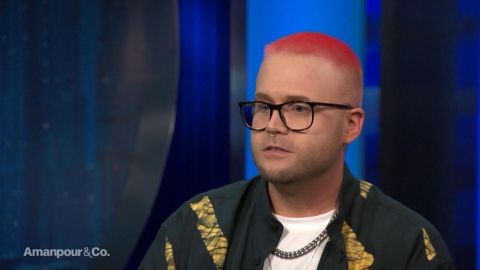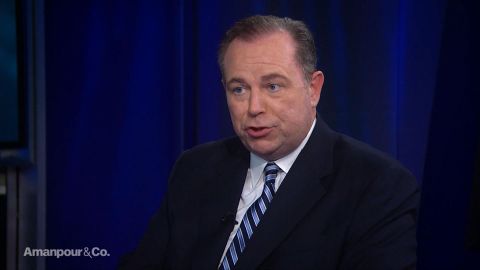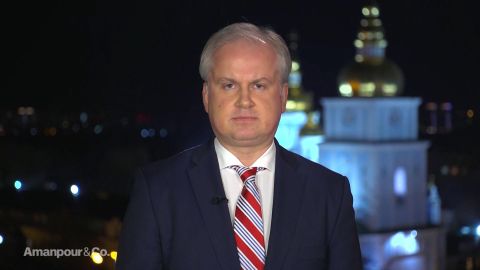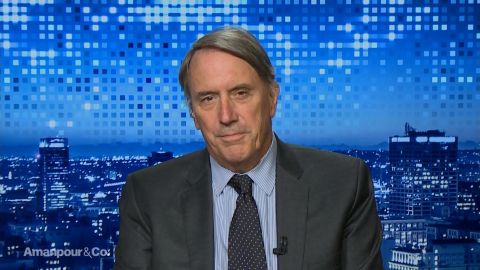Read Transcript EXPAND
CHRISTIANE AMANPOUR: Christopher Wylie last year exposed the inside story of how data analysis firm Cambridge Analytica had illegally harvested and exploited the data of millions of Facebook users. He was the former director of research for the company, which didn`t survive the scandal. And in a new book, he gives his account of what happened and what he calls the psychological manipulation behind the election of Donald Trump and the vote for Brexit here. Wylie sat down with our Hari Sreenivasan to talk data crime and its dangers to democracy.
(BEGIN VIDEOTAPE)
HARI SREENIVASAN: So who did Cambridge Analytica target? How many people? I mean, we have an enormous electorate but it`s really just a few states, maybe even a few counties that matter.
CHRISTOPHER WYLIE, DATA CONSULTANT: Cambridge Analytica was fairly surgical in how they were targeting people. You know, they wouldn`t necessarily be targeting people in California, they would be focusing their efforts on particular states, you know, where in terms of the electoral college that would be beneficial to, you know —
SREENIVASAN: So say Wisconsin, for example.
WYLIE: Yes. And so, you know — and — and when you — when you look at the types of people that the company was targeting, it wasn`t everybody that they were trying to engage with. It was very much on the margins and in the fringes of society to bring and recruit people who otherwise wouldn`t necessarily engage in conventional politics but would engage with particular kinds of ideas that they — that they promoted online. And you know, that can make an impact. If you get an extra one percent, an extra two percent in that swing state and you win that swing state, that might mean that you win the presidency.
SREENIVASAN: So was it — so for example, was it trying to get more folks on your side to vote or keeping the other teams voters from showing up at the polls? What kind of messages, what kind of influence —
WYLIE: Yes, so I think — so the campaign engaged in both what you would call GOTV or get out the vote or identifying people who were likely to vote and, you know, through their own admission, voter suppression and activities. But I think what`s important and what I talk about in the book is that, you know, the origins of why, you know, Steve Bannon wanted to engage Cambridge Analytica really rests in this idea of the Breitbart doctrine, what he — what he followed when he worked at Breitbart, which is that politics exists downstream from culture. So if you want to make an enduring and lasting change on a society, you don`t focus just on day-to- day politics, you actually focus on changing culture. And so, you know, a lot of the work that Cambridge Analytica did wasn`t necessarily just day-to-day politics, it was about changing how people perceived what was actually happening in American society and what was American society.
SREENIVASAN: So, you know, there`s these kind of — without getting too far into the weeds of the psychology, there`s these five different axes that you`re looking at people and sorting people. How does this work and how does Facebook and information from Facebook feed into that?
WYLIE: Yes. So, you know, if you imagine for a second that, you know, you`re on a blind date, right and, you know, you`ve just met somebody and, you know, by sheer coincidence, they`re able to — you know, they talk about what music they like and it happens to be exactly what you like and, you know, what kinds of TV shows and who they hang out with. And you leave that going, oh, wow, this person knows exactly — they understand me. But you know, what if that date that you went on was actually with a stalker and that — that stalker had been following you around for years and years, looking through your photos, talking to your friends, watching you at work and following you to the point where they know exactly what to say in order to lure you in. And when you`re in that moment and you don`t realize that that`s why, you know, this person on that blind date is saying that. You`re vulnerable to being exploited. And what Cambridge Analytica did was sort of a scaled version of that blind date, where people online would see things that just resonated with them. And they would be brought on to an environment, whether it would be a group or a page or a forum that was controlled by the company. But from the perspective of that — of — of the target, it`s just something that they happened to discover. So for them, their guard is down and they start reading things that appeal to them that — that they have, like, this sort of intuition that something must be — this must be true. And —
SREENIVASAN: And look at all of these other people.
WYLIE: And look at all these other people who happen to also be on this group just by sheer coincidence.
SREENIVASAN: And so it`s sort of a power of the community there, too.
WYLIE: And there`s a collective amplification of a lot of these beliefs. And what Cambridge Analytica would do would be encourage these people to talk amongst themselves to go further and further into some of these frankly outrageous beliefs.
SREENIVASAN: Yes.
WYLIE: And, you know, they would then organize things like events, people would be encouraged to meet each other. Right? And, you know, if you have a group — and let`s say it`s just a couple thousand people — Smith County patriots, whatever. Right? And only five to 10 percent of people actually show up to an event in Smith County, right? You`ve got a couple hundred people. Right? Even if you have 50 people, you flood a coffee shop with 50 people and all of a sudden what you sort of see online — you know, and intuitively you know is — it`s true — all of a sudden you see everybody around you in this coffee shop, and they`re talking about it. And you know, they might be an electrician or a plumber or a teacher, a lawyer, whatever. From your perspective, they`re just regular Americans and they don`t have an agenda. But all the things they`re talking about, you know, that Obama is moving people into Texas to take their guns or that look at all the people flooding across the border, you know, whatever. That — you hear your fellow Americans talking about it and you`re seeing it everywhere online by sheer coincidence, because that`s what everybody`s talking about, but then when you go and watch, you know, CNN or NBC or whatever, you read the New York Times, you don`t see any of this. And so from your perspective, you go, well these people don`t have an agenda but these media organizations must have an agenda and they`re misleading me, they`re the fake news, these are real people, these are honest, genuine Americans.
SREENIVASAN: Right. So what did you do inside Cambridge Analytica as part of all of this? I mean, you`re a database guy, you`re a, you know, former sort of computer hacker type. But what do you bring to the table in how that whole process unfolded?
WYLIE: Yes. So when — when I got recruited originally by the company, I was doing my Ph.D. research in fashion trend forecasting and cultural trend forecasting. And so I, by coincidence, got recruited because I happened to have a background both in looking at, as you said, databases and algorithms and all that. But also looking at, you know, how does a culture change and how does a culture evolve. And what makes something cool? Right? When I first started, we were looking at extremist groups. Right? And so —
SREENIVASAN: You`re trying to figure out why ISIS is cool and being — recruiting kids.
WYLIE: So what makes, you know, a young unmarried man in, you know, the south of England all of a sudden want to engage with pretty radical ideas, and where they go from just being a regular Joe to, you know, thinking about going to Syria? And what — what are the aspects of both their lives and their characteristics that make them prone to, you know, believing or engaging with those kinds of ideas. And what is it about those ideas that appeal to — to that target audience? And, you know, ultimately, you know, when we got acquired, a lot of that same approach was used in the United States. But we were looking at groups of people who had the same kinds of characteristics but they happened to be in America, they were Americans. And rather than trying to mitigate them joining a radical organization, you know, Steve Bannon took over and he wanted to create an insurgency in America.
SREENIVASAN: An alt-right insurgency.
WYLIE: An alt-right insurgency. And what Cambridge Analytica sort of became was a vehicle or a tool to identify people who would be vulnerable to that kind of messaging and exploit them. And, you know, when I — you know, and — and that`s not what I went into the company to do. And so when I started seeing that, you know, this company, we are now working on doing, in my view, the exact opposite of what we set out to do. Rather than protecting Americans or protecting, you know, British people or Europeans from potential harms that you get from extremism, we are catalyzing extremism. It`s just for a different flag. Those people were vulnerable, they didn`t consent or agree to be put into one of the largest psychological experiments in the United States, and that — you know, that was grossly immoral.
SREENIVASAN: You mentioned Steve Bannon. How far back does the relationship between Cambridge Analytica and the Trump campaign go?
WYLIE: Well, so that`s an interesting question because, you know, officially the company said they only joined the Trump campaign in the tail end of the election. But, you know, when I was there and after I left, I knew that they were meeting with Donald Trump, you know, before he had even announced that he was running. And there is a sort of real question about what was the company doing meeting with the what later became the — the Trump campaign when at the same time they were also officially advising Ted Cruz.
SREENIVASAN: Steve Bannon was on the Cruz campaign at the time.
WYLIE: At the time, but they were also meeting with what later became the Donald Trump campaign. And so I`m not sure what Steve Bannon had, you know, in store or in mind as to, you know, why that company was meeting with the trump campaign. But what I can say is that they were.
SREENIVASAN: You know that because?
WYLIE: I know that because I have it in writing from their own lawyers they were meeting with them. You know, I — they would deny it publicly but I have it in writing they were.
SREENIVASAN: You also point out in the book there were connections between the Russians and the Trump campaign that even the Mueller investigation missed. What did they miss?
WYLIE: Well, when you — so one of the things I talk about in the book is a lot of interactions that Cambridge Analytica has with Russian assets but also, you know, I tried to explain some of the connections between the Brexit campaign and the Trump campaign and the behind the scenes of all these alt-right people who are all meeting and talking to each other all around the world and, you know, one of the things that, you know, I revealed in the whistle blowing that happened, you know, last year, but also I talked more about in-depth in the book is, you know, that people who were traveling to the United States to meet with the Trump campaign were also, at the same time, talking to the Russian ambassador in London. They were having meetings with the Russian embassy, talking to Russian diplomats, at the same time as them traveling to the United States and meeting with Donald Trump, meeting with the Trump campaign, meeting with Steve Bannon. And when some of their associates were arrested, in the United States on charges of wire fraud and all kinds of financial crimes, which then later plead guilty to, they took that information and sent it to the Russian embassy. And so, you know, there`s a lot of questions about why was the Trump campaign talking to these people in Britain who were also, at the same time, talking to Russian diplomats? Who were talking to the Russian ambassador? And, you know, in the book, I talk about, you know, the e-mail response they had, the text messages they had, and, you know, some of the first people that Donald Trump met with were people when — after he got elected were people who were also meeting with the Russian ambassador. And none of that got disclosed, and unfortunately I feel like that issue never fully got explored in the Mueller inquiry or more broadly the Trump/Russia investigation. If you have people who are going and communicating with the trump campaign and at the same time going back to the United States — or going back to the U.K., and having meetings with the Russian embassy that seems like something that should be explored.
SREENIVASAN: And you also say in here that Russian intelligence was connected to — and backing the campaign to leave the European Union.
WYLIE: You know, the concerns that I raised with British intelligence and British law enforcement, you know, really surrounded the fact there was a lot of unusual interactions between the Russian embassy and people who were supporting our funding Brexit during the referendum.
SREENIVASAN: What`s unusual mean?
WYLIE: It`s unusual, for example, to invite Russian diplomats to a Brexit victory party. It`s unusual to have such a regular pace of meetings with a foreign diplomat and — and to — to only meet with one country`s set of diplomats. I just — for me that raises a lot of questions.
SREENIVASAN: Yeah.
WYLIE: That still haven`t been clarified.
SREENIVASAN: So even if someone met with Russian diplomats at their leave party, I can hear the leave campaign saying so what. We liked the guy, we invited him over for beers. What is Chris saying is nefarious about that?
WYLIE: I`m saying it`s unusual. I`m saying that it`s unusual to have such a close and intimate relationship with a country`s diplomat. Particularly when it`s known that this country, you know, Russia doesn`t necessarily support a lot of the values of western democracy. And, you know, I`m not necessarily saying that there is anything, you know, that the different e- campaigns did that was knowingly nefarious. What I`m saying is that you also have a very sophisticated intelligence gathering operation on the part of the Russians, and it is, every time you talk to a Russian diplomat, you are speaking to the Russian state. And I just find it suspicious you had such a close and intimate relationship with a country`s diplomats.
SREENIVASAN: What role, what responsibility do you have in all this?
WYLIE: Well, you know, when I first started at the company, I was working in something that I thought I would be helpful to society, looking at — you know, using my knowledge and skill sets to identify pathways to mitigate extremis; which was and is an emerging security threat for western democracy. The problem at the time was that, if you work in a company that is acquired and your new boss and everybody who`s in charge has made it a conscious decision to go down a path that you find, you know, morally wrong and arguably unlawful in certain context, it`s not like you can go to H.R. and say I would like to put on my file that I disagree with, like, what the company is doing.
SREENIVASAN: You could have left.
WYLIE: I did. I did. After the acquisition I only stayed for like nine months, and then I left. I was the first person to leave.
SREENIVASAN: But even before that. I mean, this is a company that, really, it was bragging to their potential clients about the kinds of work they were doing all over the world. They were influencing elections in not so great ways. For their clients, might have been a politician or somebody else.
WYLIE: Right.
SREENIVASAN: I get it. I get you were there to say, hey, if I can help decrease the influence of ISIS and make it less cool, I get that. But at some point around the water cooler you didn`t hear these guys, bragging?
WYLIE: You know, I did. And this is one of the things that I — not to use this as an excuse — but I was, you know, it was one of my first jobs, you know, first big jobs and I was 24 at the time. And when I started seeing what was happening particularly in the United States and — and how the company was repurposing a lot of work that I was working on and the others were working on and then watching footage of people or, you know, seeing, you know, people go to these events or become what, in my view, was a process of radical — you know, radicalization. That freaked me out, and I did leave. Immediately after leaving, I got sued by the company; they wanted me to sign all kinds of NDA`s and all kinds of legal pressure. I had legal bills that were, like, 50,000 pounds, and that`s a lot of pressure to be under. But, you know, nonetheless, I did try to warn people about it.
SREENIVASAN: What about the critique that here you are now, you`ve got a book out. You`re profiting from this. There was a colleague of yours — a former colleague who said Chris Wylie thinks he`s Edward Snowden when he`s actually Walter Mitty, that this is a part of you know, you figuring out a way to come out ahead in this.
WYLIE: Well, you know, what I would say to that is, you know, firstly, the — you know, the company that is really profiting from this is Facebook. You know, its share value went up at the end of the day. You know, I spent over a year, you know, even before all of the media came out, I had to be asked several times by the Guardian to actually put myself out there. I was working with law enforcement, I was working with regulators in multiple jurisdictions well before the story even emerged. And the after the story did go public, you know, I spent all kinds of, you know, hours out, hours and hours talking with members of Congress, talking with law enforcement, being a witness in several investigations. So at the end of that, thinking about all these things that happened, I chose to write a book about it because I think it`s important that people actually understand, you know, what — what happened and also what can still happen moving forward.
SREENIVASAN: Chris Wylie, thanks so much for joining us.
WYLIE: Cheers. Thank you.
About This Episode EXPAND
Christopher Ruddy sits down with Christiane Amanpour to dissect President Trump’s thinking and approach to the impeachment inquiry, then Danylo Lubkivsky gives the Ukrainian perspective on the situation. Peter Galbraith joins the program to discuss Trump’s decision to pull U.S. troops from northern Syria. Christopher Wylie speaks to Hari Sreenivasan about data crime and its dangers to democracy.
LEARN MORE



